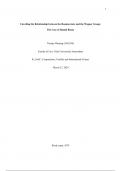1
Unveiling the Relationship between the Russian state and the Wagner Group:
The Case of Hamdi Bouta
Teuntje Wenting (2818359)
Faculty of Law, Vrije Universiteit Amsterdam
R_CorIC: Corporations, Conflict and International Crimes
March 27, 2024
Word count: 4374
, 2
Contents
1. Introduction……………………………………………………………………………3
2. Case description………………………………….....…………………………………4
3. Theoretical framework.………………………………………………………………..5
3.1 Differentiation in state-crime, corporate crime and state-corporate
xxxxxxcrime……………….…………………………………………………..5
3.2 Van Baar’s Theoretical Model………………..………………………..6
4. Analysis…………………………………………………………....…………………..8
4.1 Russian state involvement in the case study………..…………………9
4.2 Reasons behind involvement…...………………………………...…..10
5. Conclusion and discussion...…………………………………………………………13
5.1 Limitations……………………………………………...……………14
5.2 Research and policy suggestions.…………………………………….14
References……………………………………………………………………………………16
, 3
1. Introduction
Hamadi Bouta, a Syrian army deserter, was savagely beaten to death and mutilated on
camera by soldiers of the notorious Wagner Group in eastern Syria in 2017.
- New Lines Magazine, 2021.
The above news headline regarding Bouta's death by the Wagner Group exemplifies
the alarming actions of semi-state security organizations, which have emerged alongside the
significant increase in privatized security provision worldwide over the past few decades
(Marten, 2018; 2019). These groups operate with a vague connection to the state, marked by
partial acknowledgment and ambiguous contractual arrangements, often navigating through
legal gray areas (Østensen & Bukkvoll, 2018).
Russia has been an exporter of these groups for a couple of decades already (Østensen
& Bukkvoll, 2018). Under Putin’s leadership, oligarchs and other politically linked
businesspeople have become more dependent on the state to maintain power and wealth.
Consequently, this has resulted in private business interests becoming tools of Russian policy
(Stanyard et al., 2023). The Wagner group is at present the internationally most famous of the
Russian private military companies (PMC) (Stanyard et al., 2023). Wagner is often described
as a PMC connected to the Russian oligarch Yevgeny Prigozhin, who died in a plane crash on
August 23, 2023, and several factors indicate that the entity is closely linked to the Russian
state. In the past, the group has operationally been linked with the Defence Ministry of Russia
and the GU (formerly GRU) military intelligence branch (Bellingcat, 2020; Rácz, 2020).
Investigators into Russia’s military actions in Syria believe that Wagner was used as a proxy
for Russian ground forces, so that PMCs instead of the Russian state would bear the
consequences of the resulting casualties (Marten, 2019; Vasilyeva, 2017). Subsequently,
human rights groups have filed a case at the European Court for Human Rights (ECtHR)
against the Wagner Group for the 2017 murder of a Syrian national in Syria. "This case
crystallises the urgent need to hold private military groups such as Wagner accountable for
their actions and, more generally, to establish State responsibility in such cases," said
Alexander Cherkasov, chairman of Memorial Human Rights Center (International Federation
for Human Rights [FIDH], 2022a).
In line with the quote from Cherkasov, this paper aims to examine the influence of the
Russian state on crimes committed by the Wagner group in Syria. The specific case
investigation of Russian motives in employing Wagner holds significance for understanding




